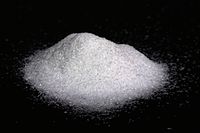
Photo from wikipedia
Monosodium glutamate (MSG) is a controversial food additive reported to cause negative effects on public health. Adipose stem cells (ASCs) and their derived vesicles (MVs) represent a promising cure for… Click to show full abstract
Monosodium glutamate (MSG) is a controversial food additive reported to cause negative effects on public health. Adipose stem cells (ASCs) and their derived vesicles (MVs) represent a promising cure for human diseases. This work was planned to compare the therapeutic effects of adipose stem cells and microvesicles in MSG‐induced cerebellar damage. Forty adult healthy male Wister rats were equally divided into four groups: Group I (control group), group II (MSG‐treated), group III (MSG/ASCs‐treated), and group IV (MSG/MVs‐treated). Motor behaviour of rats was assessed. Characterization of ASCs and MVs was done by flow cytometry. The cerebellum was processed for light and electron microscopic studies, and immunohistochemical localization of PCNA and GFAP. Morphometry was done for the number of Purkinje cells in H&E‐stained sections, area per cent of GFAP immune reactivity and number of positive PCNA cells. Our results showed MSG‐induced deterioration in the motor part. Moreover, MSG increases oxidant and apoptotic with decreases of antioxidant biomarkers. Structural changes in the cerebellar cortex as degeneration of nerve cells and gliosis were detected. There were also a decrease in the number of Purkinje cells, an increase in the area per cent of GFAP immune reactivity and a decrease in the number of positive PCNA cells, as compared to the control. Rats treated with ASCs showed marked functional and structural improvement in comparison with MV‐treated rats. Thus, both ASCs and MVs had therapeutic potential for MSG‐induced cerebellar damage with better results in case of ASCs.
Journal Title: Journal of Cellular and Molecular Medicine
Year Published: 2021
Link to full text (if available)
Share on Social Media: Sign Up to like & get
recommendations!